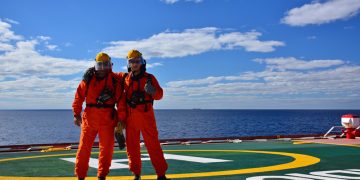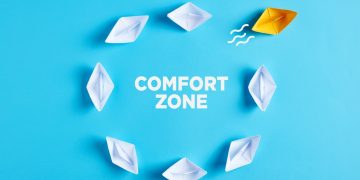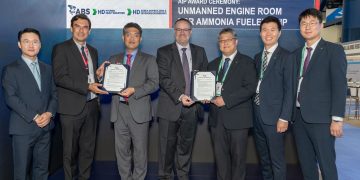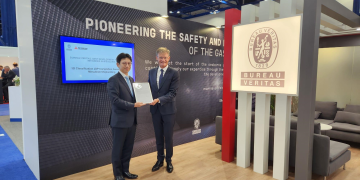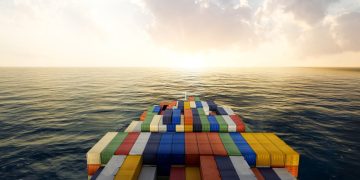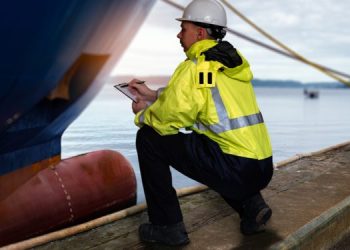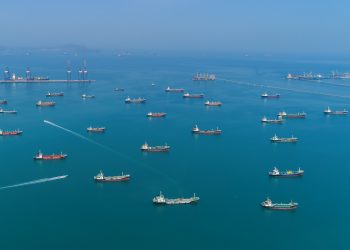The tanker shipping segment is on the verge of a significant transformation with the arrival of SIRE 2.0, notes Captain Aaron Cooper, Programmes Director, OCIMF .
The existing Ship Inspection Report Programme (SIRE), embedded within industry since 1993, has been a critical tool designed to ensure that vessels meet stringent safety and environmental standards. This updated, enhanced and digitalised vessel inspection regime seeks to revolutionise shipping inspection, compliance, and reporting.
In January, the Oil Companies International Marine Forum (OCIMF) initiated the third phase of the four-phase transition to SIRE 2.0, allowing all programme users to participate in trial SIRE 2.0 inspections for familiarisation purposes. At phase four, SIRE 2.0 will become the commercial inspection programme and the existing SIRE (VIQ7) paper-based inspection regime will be withdrawn.
Enhancing vessel assurance data
As a digitalised programme, with physical inspections, SIRE 2.0 will more accurately report on, on an ongoing basis, the quality of a vessel and its crew. It will indicate future likely performance by following a risk-based approach and using enhanced tools, strengthened governance processes and more in-depth reporting outcomes.
OCIMF has been rolling out SIRE 2.0 in a ‘phased approach’ over the past year. Phase 3, the roll-out’s industry-wide ‘beta-testing’ phase, allows all vessel operators, programme recipients, and submitting companies to familiarise themselves thoroughly with the new inspection process under SIRE 2.0.
SIRE 2.0 is a game-changing programme that requires a cultural shift in the industry. OCIMF understands that managing the change from the previous version of SIRE to SIRE 2.0 involves logistical and operational adjustments and a change in mindset among stakeholders.
One key factor contributing to the rollout’s success has been the industry’s openness to the phased approach. OCIMF decided to adopt this after recognising that a gradual approach to its implementation was needed and noting how significantly the SIRE 2.0 programme changed the way tanker inspections were conducted.
Embracing testing for readiness
The onboarding process has been made available not only to bigger but also to smaller owners and operators. SIRE 2.0 brings significant changes, and OCIMF has done everything within its means to support the entire industry in adapting to the new programme. Under the direction of OCIMF’s Vessel Inspection Programme team, set-up specifically to develop and deliver SIRE 2.0, OCIMF has ensured that all parties have been given ample opportunity to prepare for the final roll-out.
Programme users have been working exceptionally hard to familiarise themselves with all the resources and training materials developed to support the new inspection regime. The Phase 3 trial inspection period, coupled with the anonymisation of reports, allows all users to put theory into practice with no commercial implications. This allows all parties to anticipate and adapt to upcoming changes while alleviating fear and uncertainty.
Preparation is key to adapting
Phase 3, the ‘beta-testing’ phase of the roll-out, has been a great success, and the quality of the inspections already received has been consistently very high. This shows that if all guidelines are followed and training materials are used—including those designed specifically for training vessel crew—the transition to SIRE 2.0 is manageable for programme users.
A critical factor in its success has been to involve inspectors early on, gathering their input on the questions and testing the tablet. Like any new programme or technology, introducing and ensuring that SIRE 2.0 integrates seamlessly with existing systems and processes used by inspectors as well as ship operators can be complex. Recognising this, the OCIMF Training and Accreditation department has developed a mentoring programme that provides one-on-one feedback and support to inspectors, ensuring they are well-informed and understand how to operate the programme on their tablets. The training material for the programme is available for free on the OCIMF website and can be referred to at any time.
Adjusting to change for the long-term
SIRE 2.0 represents a significant upgrade from its predecessor and will help enhance the quality of inspections by effectively capturing accurate and relevant information and incorporating advanced technologies such as digital reporting tools and real-time data analytics.
Developing standardised protocols for data collection and sharing and ensuring that the system offered consistent and reliable insights across industry has been key to its implementation.
Integrating digital tools into inspections has enabled real-time data collection, analysis, and reporting, which are increasingly relied on as the industry continues to integrate digital solutions across all aspects of operation.
With the increased amount of data flowing in, it is now possible for vessel operators to quickly identify trends and gaps that were not as easy to identify with the paper-based SIRE system. In time, with the enhanced reporting outcomes and risk-based approach that SIRE 2.0 delivers, industry will become more proactive, addressing trends and risks more effectively before incidents occur, as opposed to merely reacting to them.
Enhancing governance and review procedures
OCIMF recognises that the move to SIRE 2.0 has been a particularly significant undertaking for inspectors, who have gone through a rigorous programme of training to ensure they are comfortable with conducting tablet-based inspections and are fully adapted to the new and much more comprehensive SIRE 2.0 Question Library and associated guidance.
SIRE 2.0 has Quality Assessors to provide continued support to inspectors and quality-control across the board. They will replace the existing SIRE (VIQ7) system where inspectors are audited. The Quality Assessors will work collaboratively with all programme participants globally, including submitting companies, programme recipients, inspectors, and OCIMF-approved third-party vetting contractors. They will be responsible for the day-to-day assessment of the quality of all facets of the programme, and for identifying areas for improvement and providing guidance as necessary.
Enabling industry to pre-emptively address risks
Analysing trends over time in inspection findings and helping vessel operators (and by extension industry as a whole) to identify common and emerging risks has always been a goal of SIRE 2.0. Where vessels are marked as having deficiencies or areas for improvement, action can be taken. As the question algorithm is bespoke to each vessel, these areas will be raised in subsequent inspections to ensure that action has been taken. This process will help vessel operators to understand and address issues on a fleet-wide basis, as well, and – crucially – to improve safety and performance where required.
By switching to a digitalised inspection regime, the goal is to ensure seamless integration with existing maritime data infrastructures, fostering interoperability and effective data sharing among stakeholders. This standardisation will facilitate a more cohesive and collaborative approach to maritime safety and compliance on a global scale.
OCIMF recognises that adapting to SIRE 2.0 presents a learning curve and will require programme users to dedicate the time and resources to ensure they transition successfully. SIRE 2.0 marks a pivotal moment in the evolution of maritime safety and environmental compliance. It is offering the promise of a safer, more transparent, and more efficient shipping industry. When considered from that perspective, it is only right that there should be no alternative but to look ahead and lean into the good that this change will bring.
The views presented are only those of the authors and do not necessarily reflect those of SAFETY4SEA and are for information sharing and discussion purposes only.








